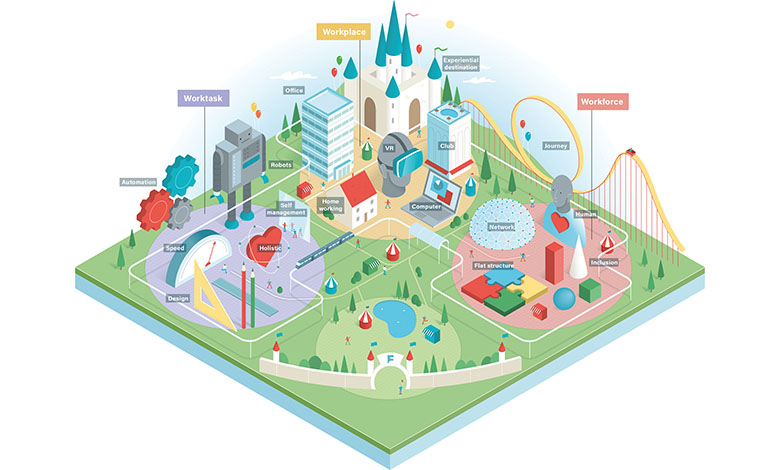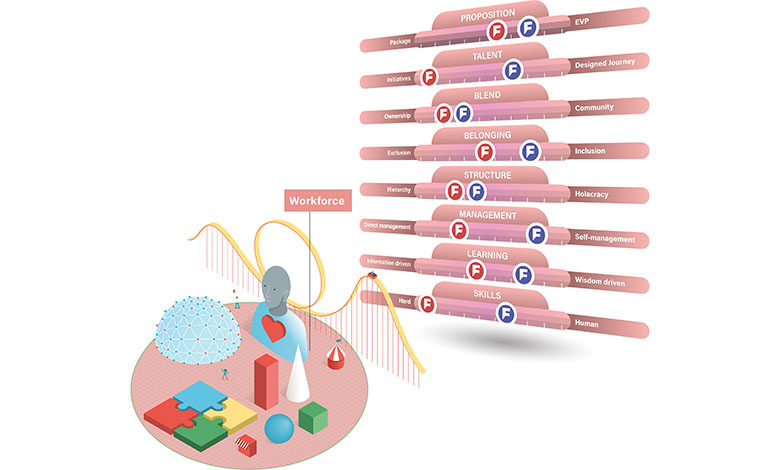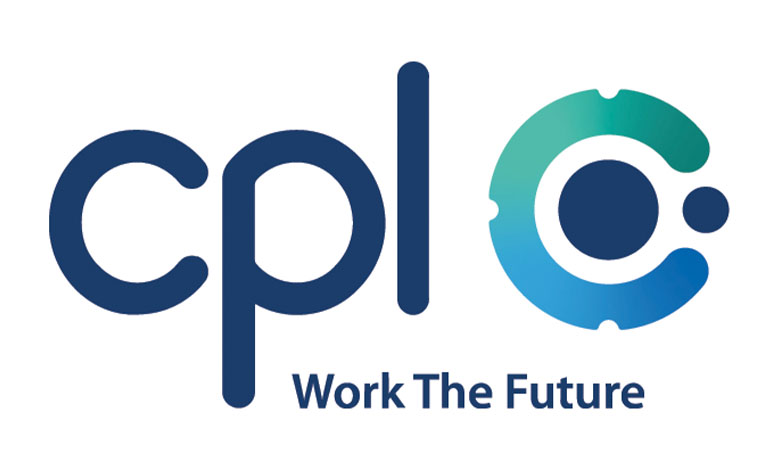Workforce of the future: Changing expectations and evolving organisations

The future of work for organisations is a story not yet fully written but there are enough plotlines to point towards a broadly defined first draft, writes Barry Winkless of the Future of Work Institute (FOWI).
Things look vastly different in the world of work. At a macro level, businesses and governments alike are dealing with mega challenges – environmental catastrophe, economic inequality, and a growing skills chasm.
At a business level, the very essence of what ‘work’ is, what constitutes a ‘job’ or what represents an ‘organisation’ is evolving at a rapid rate. Digital technologies are rewriting the rules of engagement and delivery and there are exponential challenges for organisations trying to attract and retain the best talent globally as employee expectations have evolved (most recently popularised as the ‘Great Resignation’ or ‘Great Evaluation’).
Whatever lens we look at the future of work through, it suffices to say that it means one thing for organisations: Seismic change. And, as with all change, there is an opportunity for organisations to strategically embrace it and to design for it.

The changing expectations of the workforce
Employees’ expectations have now changed when it comes to work. This has been partly accelerated by Covid-19 but has as much to do with a growing awareness of self, an appreciation of the mega connectivity of the world around us and a greater focus on meaningful work fulfilment. We have options far beyond the previous generational constructs of what work is and needs to be. We are also more discerning when it comes to the organisations we work for. From a study conducted by Cpl Future of Work Institute (FOWI) in 2022, a candidate will review more than 10 sources whilst investigating a potential new employer. There are also more work options available to us as individuals – we can work as freelancers, part-timers, contractors and gig workers. More and more of us have a portfolio career with a mix of employers and projects.
We are moving beyond the work-as-a-job and work-as-career models of thinking. It is very much work as personal experience, work as personal transformation. From FOWI research conducted in 2023, this broadly aligns with the concept of the ‘Experience Economy’ first posited by Pine and Gilmore in 1999.
From a FOWI upcoming study on the changing expectations of work and life (2024), we know, for example, that flexible and hybrid working has become the most desired, and indeed, expected workplace benefit, with 38 per cent of respondents would not even consider a new role without a hybrid option. Of those surveyed who were considering leaving their current roles, finding ‘more meaningful and stimulating work’ was a top three driver. Very tellingly, respondents highlighted leadership, values and behaviours as the second most important factor when seeking an employer. Many younger generations (under 30) will not even consider joining an organisation unless it has a significant and authentic approach to ESG.
The Master Blueprint – The 3W Future of Work model
So, how must organisations evolve to better meet the changing expectations of the workforce and drive sustained growth into the future? From FOWI’s Future Work World research at the Future of Work Institute with over 100 participating organisations (and counting), we have derived a Future of Work model – the 3W model – that can help form a coherent and structured approach to evolving the future of work firm. The 3W’s are workplace, workforce and worktask:
- Workplace – Where the work takes place across physical and virtual space;
- Workforce – How the overall workforce is designed and managed; and
- Worktask – The methods, tools and mindsets that deliver the work.
These 3W’s comprise of 18 continuums organisations can design to gain new collaborative advantages Within the Workforce ‘W’, there are eight continuums, one being, for example, the evolution from providing a good package to employees to a more intentionally designed employee value proposition that combines various forms of remuneration, benefits and more broadly defined perks and supports. Every organisation has the opportunity to create a unique future of work blueprint that aligns with the evolving expectations of the workforce of the future. From our work with multiple organisations, we often find a lack of shared definition, connected thinking and integrated strategy when it comes to the future of work, and this in itself will lead to unforeseen future challenges.
From this research, we can see that leading organisations are evolving their value system design of businesses towards a more human, technologically advanced and societal-centred model. (More than 57 per cent of businesses are aiming to be more human-centric, over 90 per cent expect emerging technologies to reshape operations, and over 80 per cent are more society-centric in the next five years).
Conclusion
Given the current challenges and changes facing us, surely now is time to create exemplar future fit organisations that are beacons for the next generation of work and talent. It is the populist thing to say that the future of work is already here – it is not, but it is in a state of becoming – and it is up to us to harness the change and build something fundamentally better for our colleagues, customers, and communities alike. It offers a genuine opportunity to create the next collaborative advantage for those organisations willing to fully harness it. Let us not squander the opportunity. Over to you.

W: www.cpl.com
L: https://ie.linkedin.com/in/barry-winkless-7357094





